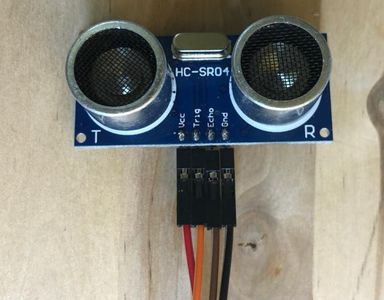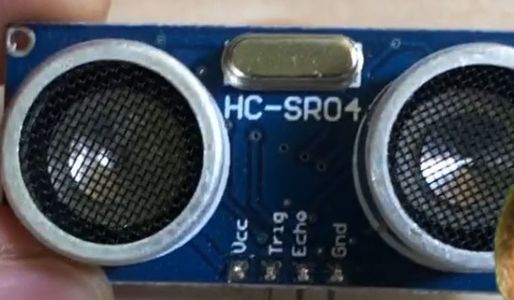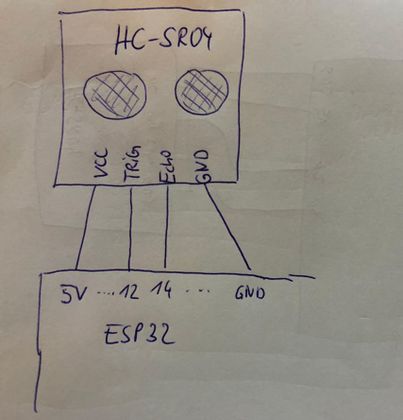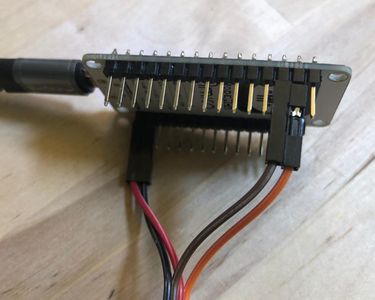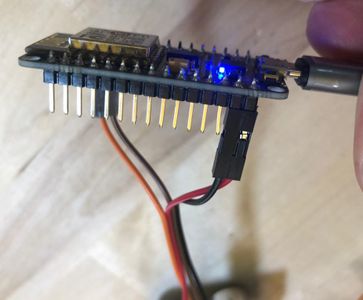Ultrasonic Sensor HC-SR04: Difference between revisions
Jump to navigation
Jump to search
| (7 intermediate revisions by 3 users not shown) | |||
| Line 43: | Line 43: | ||
= Related Tutorial Videos = | = Related Tutorial Videos = | ||
<youtube>PJdDUZWeIDs</youtube> | <youtube>PJdDUZWeIDs</youtube> | ||
= Background = | |||
connecting it to the ESP8266 and reading the signal in without a library/module. | |||
Connect Trig to Pin5 and Echo to Pin4 of the ESP8266. | |||
[[File:Hc-03.JPG|x300px]] | |||
[[File:Hc04-03.JPG|x300px]] | |||
[[File:Hc-sr04-1.JPG|x300px]] | |||
<syntaxhighlight lang="python" line='line'> | |||
import machine | |||
import utime | |||
while True: | |||
trig=machine.Pin(5, machine.Pin.OUT) | |||
trig.off() | |||
utime.sleep_us(2) | |||
trig.on() | |||
utime.sleep_us(10) | |||
trig.off() | |||
echo=machine.Pin(4, machine.Pin.IN) | |||
while echo.value() == 0: | |||
pass | |||
t1 = utime.ticks_us() | |||
while echo.value() == 1: | |||
pass | |||
t2 = utime.ticks_us() | |||
cm = (t2 - t1) / 58.0 | |||
print(cm) | |||
utime.sleep(2) | |||
</syntaxhighlight> | |||
== Code for RP2040 (with the library in the main code) == | |||
This is the version for the Arduino Nano Connect RP2040 using GPIO25 as trigger_pin and GPIO15 as echo_pin. | |||
<syntaxhighlight lang="python" line='line'> | |||
import machine, time | |||
from machine import Pin | |||
#acknowlegement for the library | |||
__version__ = '0.2.0' | |||
__author__ = 'Roberto Sánchez' | |||
__license__ = "Apache License 2.0. https://www.apache.org/licenses/LICENSE-2.0" | |||
class HCSR04: | |||
""" | |||
Driver to use the untrasonic sensor HC-SR04. | |||
The sensor range is between 2cm and 4m. | |||
The timeouts received listening to echo pin are converted to OSError('Out of range') | |||
""" | |||
# echo_timeout_us is based in chip range limit (400cm) | |||
def __init__(self, trigger_pin, echo_pin, echo_timeout_us=500*2*30): | |||
""" | |||
trigger_pin: Output pin to send pulses | |||
echo_pin: Readonly pin to measure the distance. The pin should be protected with 1k resistor | |||
echo_timeout_us: Timeout in microseconds to listen to echo pin. | |||
By default is based in sensor limit range (4m) | |||
""" | |||
self.echo_timeout_us = echo_timeout_us | |||
# Init trigger pin (out) | |||
self.trigger = Pin(trigger_pin, mode=Pin.OUT, pull=None) | |||
self.trigger.value(0) | |||
# Init echo pin (in) | |||
self.echo = Pin(echo_pin, mode=Pin.IN, pull=None) | |||
def _send_pulse_and_wait(self): | |||
""" | |||
Send the pulse to trigger and listen on echo pin. | |||
We use the method `machine.time_pulse_us()` to get the microseconds until the echo is received. | |||
""" | |||
self.trigger.value(0) # Stabilize the sensor | |||
time.sleep_us(5) | |||
self.trigger.value(1) | |||
# Send a 10us pulse. | |||
time.sleep_us(10) | |||
self.trigger.value(0) | |||
try: | |||
pulse_time = machine.time_pulse_us(self.echo, 1, self.echo_timeout_us) | |||
return pulse_time | |||
except OSError as ex: | |||
if ex.args[0] == 110: # 110 = ETIMEDOUT | |||
raise OSError('Out of range') | |||
raise ex | |||
def distance_mm(self): | |||
""" | |||
Get the distance in milimeters without floating point operations. | |||
""" | |||
pulse_time = self._send_pulse_and_wait() | |||
# To calculate the distance we get the pulse_time and divide it by 2 | |||
# (the pulse walk the distance twice) and by 29.1 becasue | |||
# the sound speed on air (343.2 m/s), that It's equivalent to | |||
# 0.34320 mm/us that is 1mm each 2.91us | |||
# pulse_time // 2 // 2.91 -> pulse_time // 5.82 -> pulse_time * 100 // 582 | |||
mm = pulse_time * 100 // 582 | |||
return mm | |||
def distance_cm(self): | |||
""" | |||
Get the distance in centimeters with floating point operations. | |||
It returns a float | |||
""" | |||
pulse_time = self._send_pulse_and_wait() | |||
# To calculate the distance we get the pulse_time and divide it by 2 | |||
# (the pulse walk the distance twice) and by 29.1 becasue | |||
# the sound speed on air (343.2 m/s), that It's equivalent to | |||
# 0.034320 cm/us that is 1cm each 29.1us | |||
cms = (pulse_time / 2) / 29.1 | |||
return cms | |||
# contributed at the UBISS2024 Seminar | |||
from time import sleep | |||
sensor = HCSR04(trigger_pin=25, echo_pin=15) | |||
sleep(1) | |||
i=0 | |||
while True: | |||
distance = sensor.distance_cm() | |||
print(i, ': Distance:', distance, 'cm') | |||
i=i+1 | |||
sleep(0.5) | |||
</syntaxhighlight> | |||
[[Category:Sensor]] | |||
Latest revision as of 15:15, 11 June 2024
Description
The HC-SR04 is an ultrasonic distance sensor that can measure distances from 2cm to 400cm. It sends out an ultrasound signal and detects the echo. By measuring the time you can calculate the distance.
more details:
- https://randomnerdtutorials.com/complete-guide-for-ultrasonic-sensor-hc-sr04/
- https://cdn.sparkfun.com/datasheets/Sensors/Proximity/HCSR04.pdf
How to connect it electrically
Required Module and Files
- We use hcsr04.py
- this is downloaded from https://github.com/rsc1975/micropython-hcsr04
- the original file is at https://github.com/rsc1975/micropython-hcsr04/blob/master/hcsr04.py
How to control it in MicroPython
from hcsr04 import HCSR04
from time import sleep
sensor = HCSR04(trigger_pin=12, echo_pin=14)
sleep(1)
i=0
while True:
distance = sensor.distance_cm()
print(i, ': Distance:', distance, 'cm')
i=i+1
sleep(0.5)
Related Tutorial Videos
Background
connecting it to the ESP8266 and reading the signal in without a library/module.
Connect Trig to Pin5 and Echo to Pin4 of the ESP8266.
import machine
import utime
while True:
trig=machine.Pin(5, machine.Pin.OUT)
trig.off()
utime.sleep_us(2)
trig.on()
utime.sleep_us(10)
trig.off()
echo=machine.Pin(4, machine.Pin.IN)
while echo.value() == 0:
pass
t1 = utime.ticks_us()
while echo.value() == 1:
pass
t2 = utime.ticks_us()
cm = (t2 - t1) / 58.0
print(cm)
utime.sleep(2)Code for RP2040 (with the library in the main code)
This is the version for the Arduino Nano Connect RP2040 using GPIO25 as trigger_pin and GPIO15 as echo_pin.
import machine, time
from machine import Pin
#acknowlegement for the library
__version__ = '0.2.0'
__author__ = 'Roberto Sánchez'
__license__ = "Apache License 2.0. https://www.apache.org/licenses/LICENSE-2.0"
class HCSR04:
"""
Driver to use the untrasonic sensor HC-SR04.
The sensor range is between 2cm and 4m.
The timeouts received listening to echo pin are converted to OSError('Out of range')
"""
# echo_timeout_us is based in chip range limit (400cm)
def __init__(self, trigger_pin, echo_pin, echo_timeout_us=500*2*30):
"""
trigger_pin: Output pin to send pulses
echo_pin: Readonly pin to measure the distance. The pin should be protected with 1k resistor
echo_timeout_us: Timeout in microseconds to listen to echo pin.
By default is based in sensor limit range (4m)
"""
self.echo_timeout_us = echo_timeout_us
# Init trigger pin (out)
self.trigger = Pin(trigger_pin, mode=Pin.OUT, pull=None)
self.trigger.value(0)
# Init echo pin (in)
self.echo = Pin(echo_pin, mode=Pin.IN, pull=None)
def _send_pulse_and_wait(self):
"""
Send the pulse to trigger and listen on echo pin.
We use the method `machine.time_pulse_us()` to get the microseconds until the echo is received.
"""
self.trigger.value(0) # Stabilize the sensor
time.sleep_us(5)
self.trigger.value(1)
# Send a 10us pulse.
time.sleep_us(10)
self.trigger.value(0)
try:
pulse_time = machine.time_pulse_us(self.echo, 1, self.echo_timeout_us)
return pulse_time
except OSError as ex:
if ex.args[0] == 110: # 110 = ETIMEDOUT
raise OSError('Out of range')
raise ex
def distance_mm(self):
"""
Get the distance in milimeters without floating point operations.
"""
pulse_time = self._send_pulse_and_wait()
# To calculate the distance we get the pulse_time and divide it by 2
# (the pulse walk the distance twice) and by 29.1 becasue
# the sound speed on air (343.2 m/s), that It's equivalent to
# 0.34320 mm/us that is 1mm each 2.91us
# pulse_time // 2 // 2.91 -> pulse_time // 5.82 -> pulse_time * 100 // 582
mm = pulse_time * 100 // 582
return mm
def distance_cm(self):
"""
Get the distance in centimeters with floating point operations.
It returns a float
"""
pulse_time = self._send_pulse_and_wait()
# To calculate the distance we get the pulse_time and divide it by 2
# (the pulse walk the distance twice) and by 29.1 becasue
# the sound speed on air (343.2 m/s), that It's equivalent to
# 0.034320 cm/us that is 1cm each 29.1us
cms = (pulse_time / 2) / 29.1
return cms
# contributed at the UBISS2024 Seminar
from time import sleep
sensor = HCSR04(trigger_pin=25, echo_pin=15)
sleep(1)
i=0
while True:
distance = sensor.distance_cm()
print(i, ': Distance:', distance, 'cm')
i=i+1
sleep(0.5)